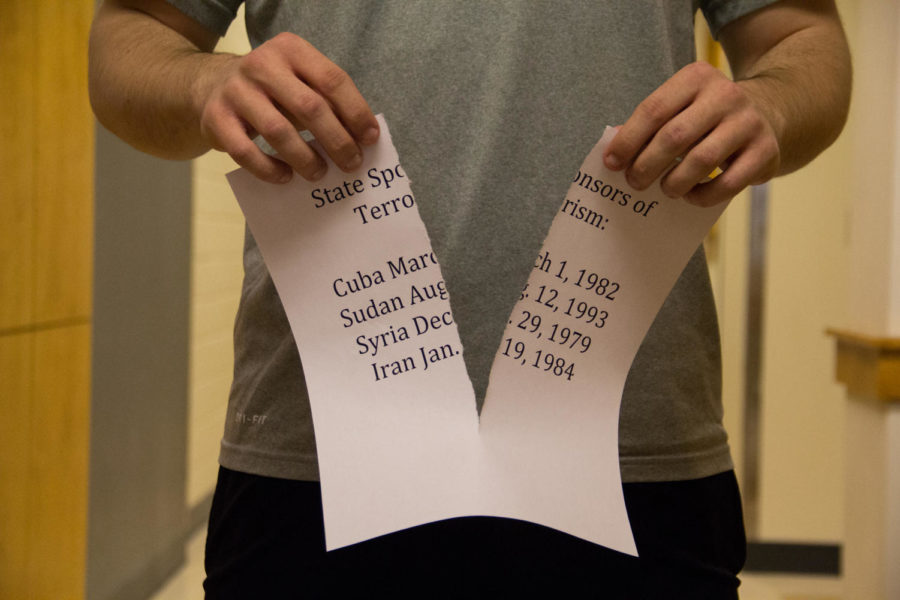Snyder: Scrap the state sponsors of terrorism list
Photo illustration: Kelby Wingert/Iowa State Daily
Columnist Snyder believes the state sponsors of terrorism list is outdated and too often hypocritical and should be discontinued.
April 16, 2015
In an attempt to foster further growth in the new relationship between the United States and Cuba, President Obama issued a report to Congress, detailing his intent to remove the island nation from the list of state sponsors of terrorism, a list that as of 2014 only included three other nations: Iran, Sudan and Syria. The list is by no means arbitrary, as the nations named on it are automatically subject to numerous economic sanctions and trade embargos. Cuba met the requirements for removal, as reported by the Miami Herald, because “it had not provided support for international terrorism during the preceding six months and Cuba had provided assurances that it would not support acts of international terrorism in the future.”
Removing Cuba from this list was cited as a critical step by Cuban President Raúl Castro. Cuba will remain on the list for another 45 days, so as long as the Cuban government doesn’t sponsor any foreign coups until at least June, they should be in the clear. While I believe that removing Cuba from the list is a good — but more importantly, correct — move because they were placed on the list in the early 1980s, the ease with which it seems a country can get itself off of the list is a little off-putting.
Six months of good behavior is not exactly an indication of a behavioral change. Hell, it takes most people more than six months to get off of telemarketing call lists (as an aside, can we get telemarketers onto the terrorism list?) For being such a serious list, it seems rather easy to be erased from it. For example, even if Congress rejects Obama’s proposal — which, given the two parties’ less than stellar record for cooperation, is very possible — their dissent and any action taken to keep Cuba on the list can be (will be) vetoed by President Obama, leading to a whole lot of political posturing and other generally frustrating time wasting political techniques.
Secretary of State John Kerry said Cuba was “originally designated as a state sponsor of terrorism because of its efforts to promote armed revolution by forces in Latin America.” I seem to remember a different nation interfering in Latin America by supporting and funding revolutionary groups. Specifically in Nicaragua, specifically the Contras.
The United States funded revolutionary groups more recently than we put Cuba on the state sponsors of terrorism list. Not only did the Reagan administration technically commit high treason by selling weapons to Iran — a nation that would then be on the state sponsors of terrorism list in 1984 — but it used the profits to do exactly what we had been condemning Cuba for doing.
Additionally, Syria and Sudan, the two unmentioned nations on the list, have their own reasons for being odd to have on the list. Syria is now a nation that is more concerned about being terrorized (by ISIS) than it is with supporting terrorism, and Sudan, placed on the list in 1993, has since broken into two different nations. While one of those nations is still Sudan, could we at least reaffirm their spot on the list, if only for my own understanding?
This list is completely useless. Not only for the countries on it, but for those that are not as well. North Korea was on the list, but was removed even though the Asian nation attacked American Internet services less than six months ago — and even in that case, it appears the U.S. government was hacking them first. Iran will most likely be the next to come off, even though they are currently supporting the Houthis and Shia groups in Yemen to make sure al-Qaeda forces do not take control of the embattled nation.
How can the U.S. make nuclear deals and ease sanctions on a nation that is on the state sponsors of terror list? In short, we can’t, but because the Iranian nuclear deal is the best possible solution anyone has had for limiting Iran’s nuclear capabilities, the plan should not be stopped. Iran’s supreme leader may very well look to Cuba’s removal from the state sponsors of terror list and say, “I’ll have what he’s having.”
The list, in its entirety, should be scrapped. If it meant something of significance at one point in time, that time is long passed. The United States can certainly continue to restrict the abilities of “dangerous” nations to do business on the international level, but that new list should be a little less outdated and a lot less hypocritical.







